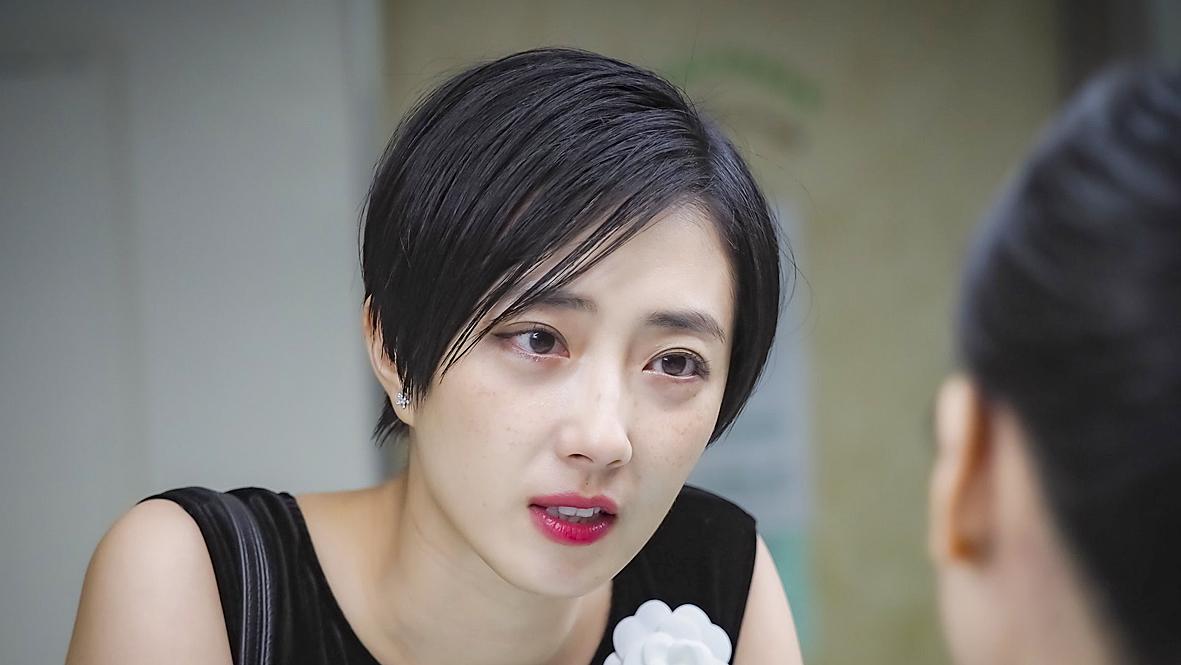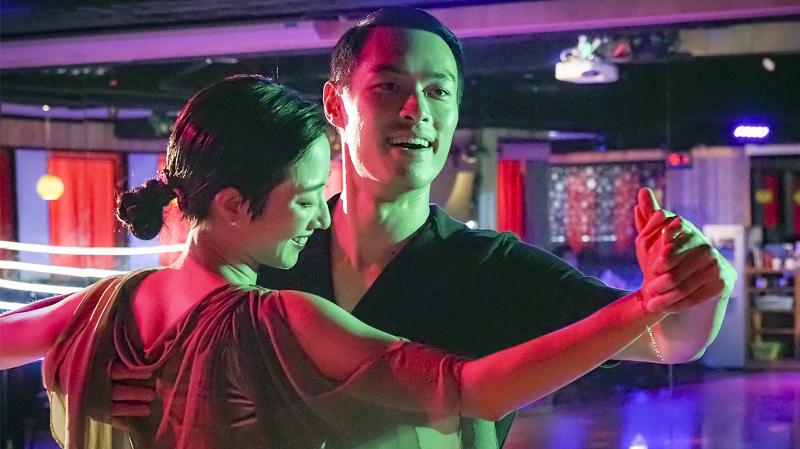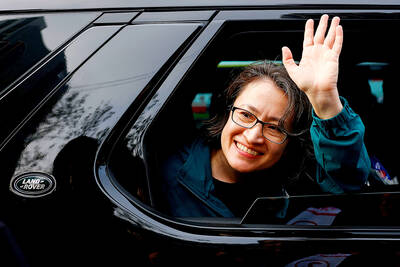When you spend an entire film following a hysterical woman doggedly searching for her just-deceased husband’s amputated leg, you expect there to be some deep, symbolic revelation to the quest — or at least some sort of crazy plot twist. But instead it just serves to tell a quite conventional, formulaic story about love and loss, which some viewers will find immensely moving (there was much sobbing in the theater). Yet it just feels that director Chang Yao-sheng (張耀升) could have done so much more.
It’s not so bad that the film is unwatchable. There is plenty of dark humor and excellent acting from lead Gwei Lun-mei (桂綸鎂), who convincingly delivers her role of Yu-ying without veering into caricature: you both love and hate her. The film opened this year’s Golden Horse Film Festival and was nominated for five awards, although it failed to bag any.
There’s actually a moving backstory to A Leg: Chang’s mother embarked on the same quest after his father died, raising hell for everyone around her until she found the amputated limb. Chang says his mother’s journey was even more extreme than is depicted here, as she didn’t start the search until the 27th day after the amputation and even enlisted the help of politicians and gangsters to pressure the hospital to give it up.

Photo courtesy of Applause Entertainment
What’s also relevant to the film is the fact that Chang’s parents didn’t exactly have a loving relationship. His mother simply wanted to do one last thing for her husband so he could leave this world in one piece. This notion is actually quite thought-provoking and should be more than enough for a worthy feature film. Plus, the screenwriting partnership between Chang, an acclaimed novelist, and cinematographer Chung Mong-hong (鍾孟宏) saw smashing success last year with A Sun (陽光普照), creating great hype and hopes for this film.
The problem is that there’s just something too glossy and too sappy about the love story portrayed in A Leg: two charming ballroom dancers fall in love and marry, but their relationship is rocky as Yu-ying’s husband, Tzu-han (Tony Yang, 楊祐寧), is reckless and frequently gets into trouble. The relationship eventually falls apart and Tzu-han ill-advisedly tries to redeem himself.
Tzu-han’s faults are quite typical, often just doing what he feels is right for the relationship without consulting the partner and refusing to communicate. Yu-ying starts out rather innocent albeit with a tough streak, but as their marriage crumbles she develops into the relentless character we see in the opening scene.

Photo courtesy of Applause Entertainment
The whole story is told in flashbacks and narrated by Tzu-han, who sounds deeply sorry for what he did, while Yu-ying drives the story forward in her manic quest to get the leg back from the hospital. Since they both make a living using their legs, it becomes a central theme to the story, which is also a clever device.
The resulting product is meant to be somewhat surreal and funny, but it tries too hard to play the overly-packaged, lovey-dovey emotion card, making many of the scenes and sequences unbelievable even while knowing that it is an attempt at humor. Despite the superb acting, the characters toe the line between authenticity and parody and don’t go deep enough in either direction, making them hard to relate to and difficult for the viewer to immerse themselves into the plot.
Too many shenanigans and too long of a running time obfuscate the central question: Why is Yu-ying risking it all for someone who is already dead, especially after how he treated her? Maybe the answer is meant to be that simple, but Chang tries too hard to highlight the long-winding love story and doesn’t take the fascinating leg concept far enough, resulting in this reviewer leaving the theater feeling rather empty.

The year was 1991. A Toyota Land Cruiser set out on a 67km journey up the Junda Forest Road (郡大林道) toward an old loggers’ camp, at which point the hikers inside would get out and begin their ascent of Jade Mountain (玉山). Little did they know, they would be the last group of hikers to ever enjoy this shortcut into the mountains. An approaching typhoon soon wiped out the road behind them, trapping the vehicle on the mountain and forever changing the approach to Jade Mountain. THE CONTEMPORARY ROUTE Nowadays, the approach to Jade Mountain from the north side takes an

Last week Joseph Nye, the well-known China scholar, wrote on the Australian Strategic Policy Institute’s website about how war over Taiwan might be averted. He noted that years ago he was on a team that met with then-president Chen Shui-bian (陳水扁), “whose previous ‘unofficial’ visit to the US had caused a crisis in which China fired missiles into the sea and the US deployed carriers off the coast of Taiwan.” Yes, that’s right, mighty Chen caused that crisis all by himself. Neither the US nor the People’s Republic of China (PRC) exercised any agency. Nye then nostalgically invoked the comical specter

Relations between Taiwan and the Czech Republic have flourished in recent years. However, not everyone is pleased about the growing friendship between the two countries. Last month, an incident involving a Chinese diplomat tailing the car of vice president-elect Hsiao Bi-khim (蕭美琴) in Prague, drew public attention to the People’s Republic of China’s (PRC) operations to undermine Taiwan overseas. The trip was not Hsiao’s first visit to the Central European country. It was meant to be low-key, a chance to meet with local academics and politicians, until her police escort noticed a car was tailing her through the Czech capital. The

April 15 to April 21 Yang Kui (楊逵) was horrified as he drove past trucks, oxcarts and trolleys loaded with coffins on his way to Tuntzechiao (屯子腳), which he heard had been completely destroyed. The friend he came to check on was safe, but most residents were suffering in the town hit the hardest by the 7.1-magnitude Hsinchu-Taichung Earthquake on April 21, 1935. It remains the deadliest in Taiwan’s recorded history, claiming around 3,300 lives and injuring nearly 12,000. The disaster completely flattened roughly 18,000 houses and damaged countless more. The social activist and